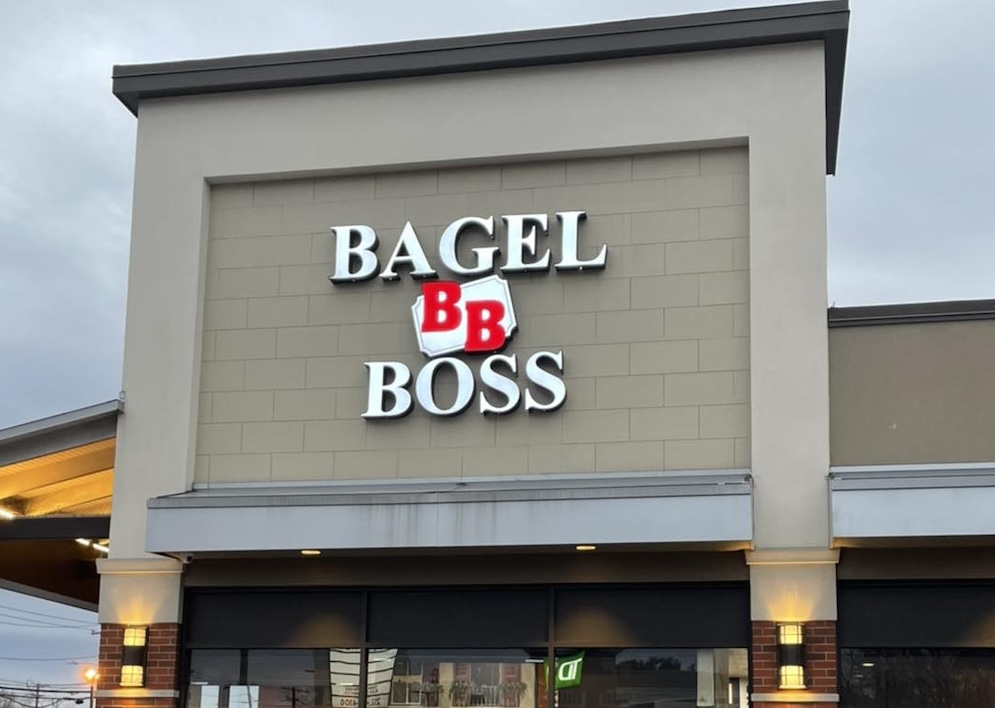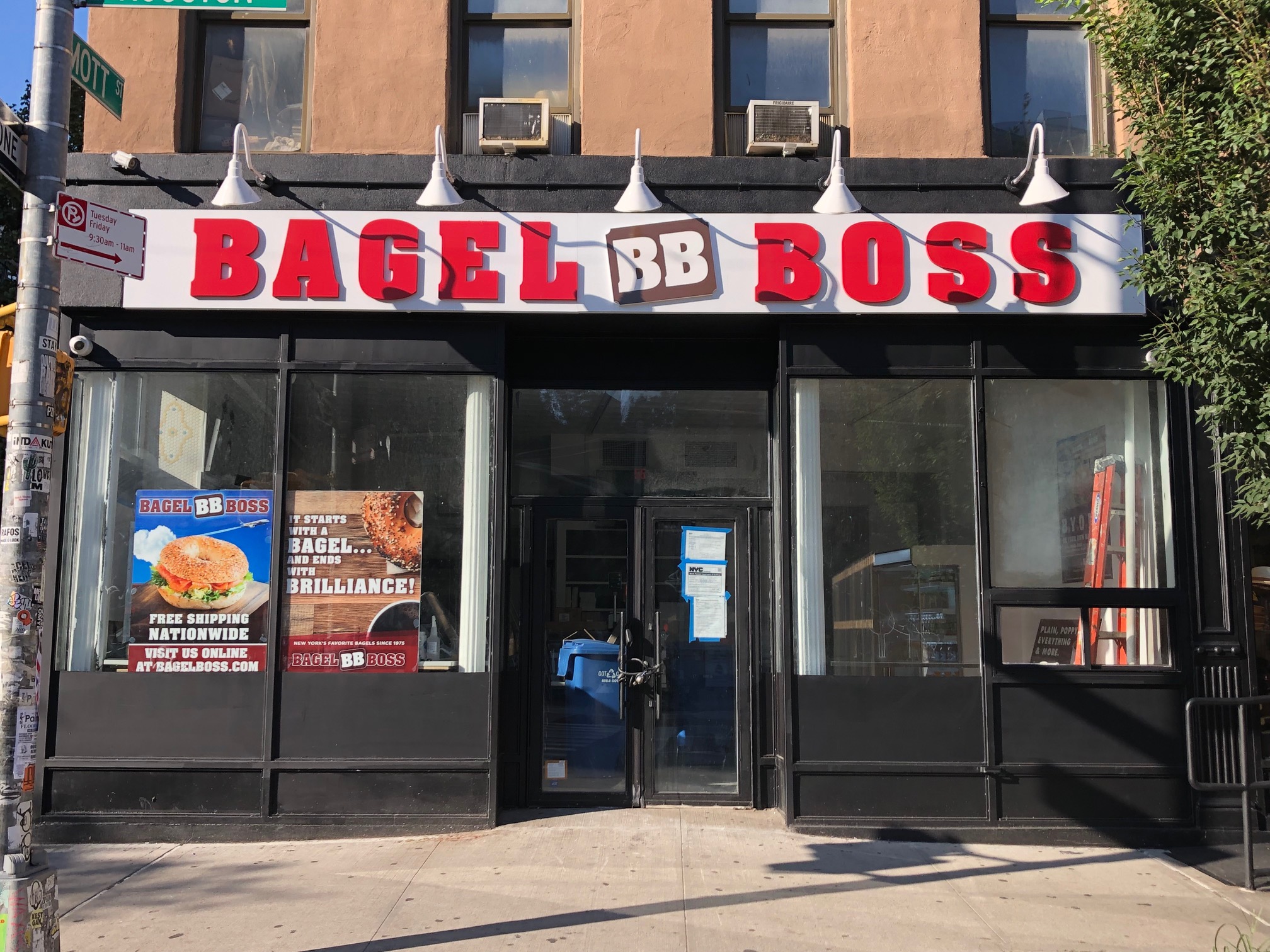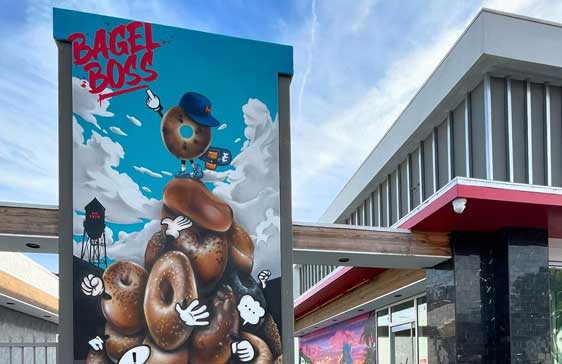Where Was The First Bagel Boss? Uncovering A Long Island Legacy
Have you ever wondered about the beginnings of a truly beloved food institution? It's a common thought, especially when you consider places that become a part of the everyday fabric of a community. People often ask, "Where was the first Bagel Boss?" This question really taps into a sense of curiosity about heritage, about how something so familiar and comforting got its start. Knowing the origins of a place like Bagel Boss helps us appreciate the journey it took to become what it is today, a staple for many who crave that perfect chewy bite. So, in a way, it's about more than just a location; it's about a story.
The story of Bagel Boss, you see, stretches back quite a bit, tracing its roots to a specific spot on Long Island. It’s a tale that involves family, a drive to innovate, and a clever bit of business thinking. For many, a fresh bagel is more than just breakfast; it’s a small piece of tradition, a comforting routine. Knowing where that tradition truly began, the very first place where the ovens warmed and the dough took shape, offers a deeper connection to the food we enjoy. It’s quite interesting, isn’t it, to think about the humble beginnings of something so widely known now?
This article will take a look at the very first steps of Bagel Boss, exploring its foundational location and the family efforts that shaped its early days. We'll explore the specific year and town where it all began, and touch upon some of the creative ideas that helped this business grow from a local spot into something much bigger. You'll also learn about a unique bagel creation that changed things up, and how a simple name change made a difference. It’s basically a trip back to where a Long Island favorite first made its mark.
Table of Contents
- The Original Home of Bagel Boss
- A Family Affair: Shaping the Bagel Business
- The Flagel: A Revolutionary Creation
- A Clever Name and Early Growth
- From Neighborhood Bakery to National Presence
- Frequently Asked Questions About Bagel Boss
The Original Home of Bagel Boss
The very first Bagel Boss store, where the aroma of fresh bagels first filled the air, opened its doors in 1976. This significant event took place in Hicksville, a community nestled right on Long Island. It’s pretty clear, then, that this particular spot was the starting point for what would become a much larger enterprise. The establishment of the business itself, the idea behind it all, actually goes back a bit further, to 1975, but the physical store, the place where customers could first walk in and grab a bagel, truly began in 1976. So, you know, it was a pretty exciting time for the family and for the community, too.
Hicksville, Long Island, in 1976, was a community ready for something special, and a new bagel shop certainly fit the bill. This initial location wasn't just any store; it was the foundation, the place where all the early efforts and dreams came together. It represented a bold step for the family behind it, bringing their vision of a great bagel experience to life. That first location, you see, was more than just a building; it was where the legacy truly began to take shape, serving as a neighborhood gathering spot and a source of delicious baked goods. It’s almost like, the very first step on a very long path.
This specific spot on Long Island, then, holds a special place in the history of Bagel Boss. It’s where the recipes were perfected, where the first customers were served, and where the family's dedication to the bagel business really shone through. The decision to open there, in Hicksville, helped establish a local presence that would eventually grow far beyond its initial boundaries. It's quite something to think about how a single store, in one town, could be the origin point for something that would touch so many lives. And, you know, that's pretty cool.
- Maal49com
- Sean Hannity Wedding Date
- Brooke Teague And Nathan Smith
- What Is Wrong With Peter Doocys Wife
- Peter Doocy First Wife
A Family Affair: Shaping the Bagel Business
The story of Bagel Boss is deeply rooted in family, a tradition passed down through generations. The very first store, and the subsequent growth, came about through a collective effort. My father, Mel, played a central role, working alongside me to get things going. We also had the invaluable help of my two younger brothers, Jerry and Adam. This combined family energy, you see, was absolutely key to transforming the bagel business. It wasn't just one person's idea; it was a shared dream, a group effort to bring something truly good to people.
This family involvement meant that every step of the process, from making the dough to serving the customers, carried a personal touch. The commitment to quality and the desire to make the best bagels possible were, in a way, inherited traits. Being 5th and 6th generation bagel makers, as we are, means there's a deep understanding of the craft, a knowledge passed down through time. It’s basically a long line of expertise, a heritage of baking that really informs everything we do. This deep family history, you know, gives the business a kind of soul.
The collective effort of the family, working together from those early days, truly helped shape the way Bagel Boss operated and grew. It was about more than just selling bagels; it was about building a business on shared values and hard work. The presence of my father and brothers, lending their hands and ideas, created a strong foundation. This kind of collaborative spirit, honestly, is what helps a business not just survive, but thrive, making it a beloved part of its community. It's a pretty powerful thing, that family connection.
The Flagel: A Revolutionary Creation
Innovation has always been a part of the Bagel Boss story, and one of the most notable examples of this creative spirit is the Flagel. This unique item, also known as the flat bagel, was first created and trademarked by Bagel Boss in 1999. It represents a clever twist on a classic, offering something different to bagel enthusiasts. The Flagel, you see, came from a desire to give customers a new experience, something that combined familiar tastes with a fresh form. It’s quite a distinctive item, that's for sure.
The genius of the Flagel lies in its design: it provides customers with the best of both worlds, in a way. By flattening the bagel, it creates more surface area for toppings and a different texture. You get more of that crispy crust, which many people love, while still enjoying the distinct flavor of a bagel. This thoughtful creation was a response to what people might want, a way to enhance the bagel experience without losing its essence. It was, arguably, a stroke of genius, offering a new dimension to a beloved food. That's a pretty smart move, really.
The creation of the Flagel in 1999 shows a willingness to experiment and push the boundaries of what a bagel could be. It wasn't enough to just make good traditional bagels; there was a drive to innovate and offer something truly new. This kind of forward thinking helped Bagel Boss stand out in a competitive market. It’s a clear example of how a business can evolve by listening to its customers and daring to try something different. And, you know, that kind of creativity really makes a difference.
A Clever Name and Early Growth
A smart business decision early on helped Bagel Boss establish its presence in a very practical way. The store was rechristened "Bagel Boss" with a very specific goal in mind: to be the first bagel store listed in the yellow pages. This move, you see, was a simple yet effective marketing strategy for its time. In an era before widespread internet use, the yellow pages were a primary tool for people looking for local businesses. Being at the top of the list meant immediate visibility, a clear advantage over competitors. It was, frankly, a brilliant piece of foresight.
This strategic naming helped the business gain an early edge. By ensuring "Bagel Boss" appeared first, it captured the attention of potential customers right away. This early visibility contributed significantly to the store's initial growth and recognition within the community. It’s quite interesting how such a seemingly small detail could have such a large impact on a business's trajectory. You know, sometimes the simplest ideas are the most powerful. This particular choice really set things up nicely.
Soon after the renaming, a competitor opened, which just goes to show the growing popularity of bagels and the competitive nature of the business. However, having already established its name and position, Bagel Boss was well-prepared. The clever naming strategy, combined with the family's dedication to quality, allowed the business to continue its expansion. It's basically a testament to thinking ahead and securing a spot in the minds of customers. This initial period of growth, and the smart choices made, paved the way for future success. Learn more about bagel history on our site.
From Neighborhood Bakery to National Presence
From its humble beginnings as a neighborhood bakery in Hicksville, Bagel Boss has truly blossomed. Established in 1975, with the first store opening in 1976, the business has seen remarkable growth over the years. It started as a local spot, a place where people from the community could come for their daily bagel fix, a comforting part of their routine. This initial focus on serving the local area helped build a strong reputation, one customer at a time. It's quite a journey, you know, from a single shop to something so much bigger.
The dedication to quality and the strong family values that defined the early days continued to drive the business forward. Bagel Boss has over 50 years of experience now, a significant amount of time spent perfecting the art of bagel making. This deep experience, honestly, is what allows them to consistently deliver a great product. The knowledge accumulated over half a century, passed down through generations, ensures that every bagel meets a certain standard. It's pretty clear that this long history is a major part of their success.
Today, Bagel Boss has grown far beyond its Long Island roots, transforming into a franchise brand. This means that aspiring bagel shop owners nationwide now have the opportunity to bring the Bagel Boss experience to their own communities. It’s a huge leap from that single store in Hicksville, demonstrating the enduring appeal of their product and their business model. This expansion, you see, speaks volumes about the brand's strength and its ability to connect with people across different regions. It's basically a national presence now, which is quite impressive. We invite you to explore more about our journey on this page.
Frequently Asked Questions About Bagel Boss
When did Bagel Boss officially start making bagels?
The business, with its deep family roots in bagel making, was established in 1975. The very first physical store, however, opened its doors to customers in 1976. So, you know, there's a slight difference between the founding year of the business idea and the opening of the first actual shop.
Who were the key family members involved in the beginning?
My father, Mel, was a central figure in the early days, working alongside me. My two younger brothers, Jerry and Adam, also played a crucial role in helping to develop the business. It was, in some respects, a true family effort from the very start.
What is a Flagel, and when was it created?
A Flagel is a unique, flattened bagel, also known as a flat bagel. It was created and trademarked by Bagel Boss in 1999. This innovation provides a different texture, offering customers more of that delicious crust. It's basically a creative take on a classic, giving you the best of both worlds.
- Wwwtickzoo Casinocom
- Beatrice Mccartney
- Sophie Rain Spiderman Video T
- Luke Wilson Wife
- Todd Cohen Net Worth

Crazy Facts About Long Island’s Place in Food History - Long Island

EV Grieve: Bagel Boss opens on 14th Street

Murals - Visit Burbank